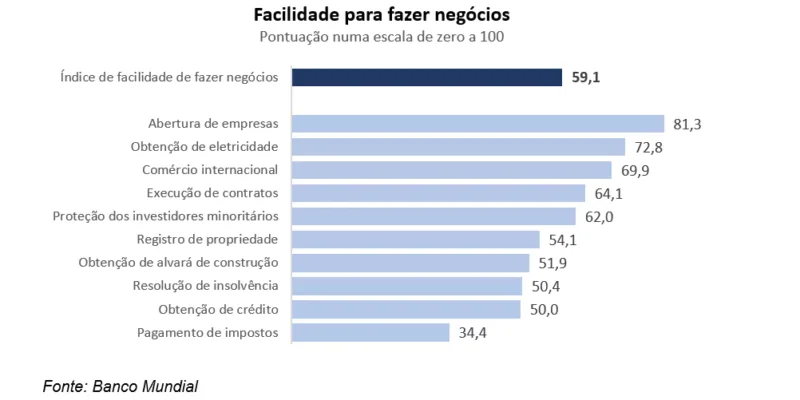Since 2003, the World Bank organizes a ranking that classifies countries according to whether they are more or less easy to do business with. The aim of the survey is to compare the regulatory environment in different countries and thus help organizations make decisions. With the ranking, it is possible to decide, for example, whether it is more favorable to start and maintain a business here or in Bangladesh.
The ranking evaluates ten dimensionsfrom obtaining permits to build business units to the process of paying taxes, including access to credit. On a scale of zero to 100, the country achieved a score of 59.1, with the lowest score being in the area of paying taxes. In this area, Brazil scored 34.4 points, placing it among the last countries in the ranking. The highest score was obtained in the process of starting a business (81.3 points). The graph below details Brazil's score in each of the indicator's dimensions:
The credit cut-off
Although the report allows for a more detailed analysis of various regulatory aspects, we will focus on the contracting of credit, which is essential for the maintenance and development of businesses of all sizes and sectors.
The score for the process of obtaining credit was 50, also on a scale of zero to 100 points. This dimension of ease of doing business includes two items, with very different performances. The first evaluates the depth of credit informationto measure the scope, coverage and accessibility of this data. Providing credit information on individuals and companies, positive and negative, point counts, as well as the number of individuals and companies listed in credit bureaus.
The second question concerns degree of borrower protection (those who take out a loan) and lenders (those granting a loan) in bankruptcy and collateral law. This aspect of obtaining credit analyzes, for example, the possibility for a creditor to enforce his right to a guarantee out of court, by agreement between the parties, and the possibility for secured creditors to have priority in payment in the event of liquidation of the debtor company.
In depth of coverage of credit informationBrazil achieved the highest score, alongside 53 other countries. According to the "Doing Business 2020" report, the percentage of individuals with some credit information in the bureaus, taking a five-year horizon, was 81.2%, a figure above the average percentage observed among OECD countries, which reached 66.7% in the latest survey.
The document also shows the the importance of bureaux and the evolution of this sector around the world. In 2005, only 67% of economies had private credit bureaus or public loan registries. In 2019, this percentage rose to 88%. The data collected by the institution also suggests that the presence of credit bureaus is associated with a higher level of credit as a proportion of GDP. GDP.
It is in the quality of the legislation on bankruptcies and guarantees that we can identify a major opportunity for improving the Brazilian credit market. In this area, Brazil scored 2 out of 12 points, below the average for Latin American and Caribbean countries (5.3 points). By means of a guarantee, lending institutions are able to limit losses in the event of default. In this sense, regulatory progress could, more than raising Brazil's score in the world ranking, reduce the cost of credit at the end, reducing legal uncertainty and stimulating the formation of new businesses.
One Central Bank study estimated the impact of guarantees on interest ratesin order to control for other factors affecting the cost of credit. The results showed that the interest rates charged on unsecured personal loans are almost double those charged on secured loans.
Concerns about the business environment in Brazil prompted the publication of the Economic Freedom Provisional Measure in 2019, through the work of the Secretariat for Debureaucratization, Management and Digital Government. The provisional measure was later transformed into a law, freeing up more hours for establishments to operate, making labor legislation more flexible and waiving the requirement to present a license for those carrying out low-risk activities. The new economic freedom milestones also take into account the reality of digitalization, allowing work cards to be issued electronically.
This agenda continues. The aim is to increasingly reduce the bureaucratic burden that hinders business development. On the subject of obtaining credit, the monetary authority and the Special Secretariat for State Modernization signed a memorandum to improve Brazil's rating in this area. The goal is to raise the current score from 50 to 70 by the end of 2022. Other agreements have been signed, aimed at increasing the score in the other dimensions of the indicator and placing the country among the top 50 economies with the greatest ease of doing business. This would be a remarkable step forward.
Thanks for reading! Access other content at ANBC website.
By: Elias Sfeir President of ANBC & Member of the Climate Council of the City of São Paulo & Certified Advisor




